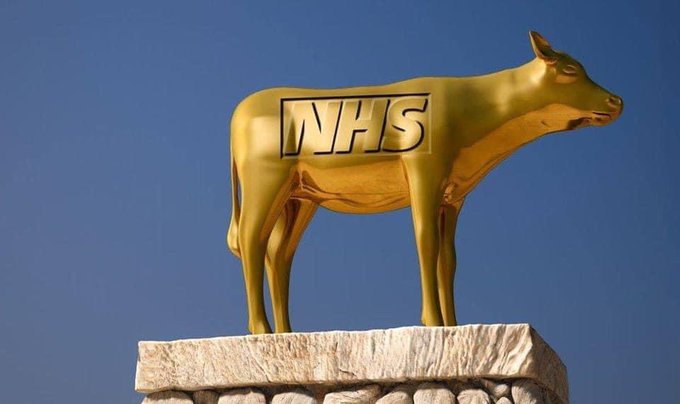Another child killed by the NHS. What a craphole the NHS really is.
I vehemently object to how the National Health Service has been promoted as some sort of national religion to replace the formerly venerated Church of England. I object to this behaviour on the theological grounds that worship of the man made NHS should not replace the worship of the Eternal One and secondly I object to it because the NHS is clearly and obviously not worthy of such worship and veneration.
The NHS is a complete mess. People wait months and sometimes years for poor quality and badly administered healthcare of a sort that would not be tolerated in any other advanced nation. Even when people do get to be treated by the NHS after a long wait there’s no guarantee that the service will be free of politically correct bollocks or even acceptably safe.
One area where the NHS is clearly failing is in maternity and paediatric medicine. The NHS has an unenviable reputation for having maternity units that are unfit for purpose. According to a BBC report last November, 67% of NHS maternity units are considered as unsafe for either mothers or their babies.
Now another NHS horror story of awful NHS paediatric care has emerged this time from Kettering Hospital. In 2016 a 23 month old toddler calledJorgie Stanton-Watts died two weeks before her second birthday of dehydration and sepsis that may well have been caused by piss poor treatment by the NHS. There was a police investigation into this child’s death but there have been allegations made by former police officers that the case was shelved because the police thought it too difficult to go after hospital employees for manslaughter.
The BBC has done an extensive report into this case and because of the danger that this report might be taken down or edited by the BBC in the future I’m quoting much more of this piece than I normally would do.
The BBC said:
In 2016, Kettering General Hospital (KGH) became the focus of a major criminal inquiry. Documents seen by the BBC reveal detectives looked for evidence of gross negligence manslaughter over the treatment of Jorgie Stanton-Watts, a vulnerable toddler.
Seven years of investigations followed, by the hospital, regulators and a coroner. This is the story of a family’s struggle to hold people to account.
Jorgie died on Saturday 8 October 2016 from the results of dehydration and sepsis.
Her mother Nicola Stanton, 49, says she went home distraught, but on Monday morning was surprised to find the police at her door.
“They said ‘If your daughter had died of dehydration while in your care, you’d be looking at a prison sentence and your other children would be removed.’ We knew then something wasn’t right.”
From birth, Jorgie was in and out of hospital with a pituitary gland problem that affected her development and made her face puffy.
Her grandmother, Zena Stanton, 72, shows a video of her wriggling happily on a play mat and listening to her favourite song, Maggie May.
“Jorgie was known as ‘Sunshine’ – she was always happy-go-lucky, but for those few days at KGH, she was in agony,” she says.
“She wouldn’t even let us pick her up for a cuddle.”
Since Jorgie’s death, a BBC investigation has heard from more than 50 parents with serious concerns about the treatment of their children, many of whom died or suffered injury.
The Northamptonshire hospital has also been inspected regularly.
In April the Care Quality Commission (CQC) downgraded the hospital’s children’s services to inadequate, the lowest possible rating.
‘Inadequate’ isn’t just a description of this awful individual hospital, it’s a word that could be used quite accurately to describe the entire NHS. The more I read of how this poor sick child was treated the more angry I become at Britain’s terminally shitty healthcare system.
A paediatric consultant who gave evidence at this child’s inquest said that at least one of the medical decisions made at the hospital by a doctor was ‘inexplicable’ and contributed to the dehydration that this poor child suffered.
The BBC added:
Jorgie was admitted to KGH on 29 September 2016 with a cold.
Soon afterwards, she developed an infection and was moved to Skylark Ward, a 26-bed children’s unit.
Then things began to go wrong.
Unable to produce the stress hormone cortisol, Jorgie needed a higher dose of hydrocortisone if she was poorly.
However, on 2 October her consultant, Dr Pratibha Rao, reduced her dosage by switching from intravenous to oral medication.
This decision was “inexplicable”, according to Dr Richard Stanhope, a paediatric endocrinologist who gave evidence at Jorgie’s inquest.
He concluded it “almost certainly” led to severe dehydration.
But staff failed to notice. Jorgie’s nappies were not weighed, as they should have been, and other warning signs ignored.
“It was a complete lack of care,” Nicola says.
“Jorgie was well known on the ward so the way she was treated hurt us even more.
“One of the nurses even took a monitor off me because it was constantly beeping and doing their heads in.”
This is just completely appalling behaviour by staff. Firstly the change in drug regime which caused the dehydration problem and secondly the failure of staff to monitor nappy contents in order to check on any dehydration problems. I’m gobsmacked by this as monitoring nappy contents is a base level care action that anyone, whether they be a parent or a healthcare professional, should be doing. I’m absolutely seething at the attitude that the nursing staff are claimed to have shown. They knew this child was sick, they dished out piss poor and inadequate care and in addition chose to put their own selfish desires for quiet over the need to monitor this child’s vital signs.
These disgusting NHS fuckers couldn’t even be arsed to keep proper notes about this child’s condition.
The BBC continued:
On 5 October, the day Jorgie collapsed, no observations had been carried out and almost nothing written in the nursing notes.
It fell to a lab worker to raise the alarm after receiving the results of a delayed blood test and Jorgie was urgently collected by a team at Leicester Royal Infirmary (LRI).
But her condition was irreversible.
She died on 8 October, two weeks before her second birthday.
As someone who has lost a loved one due to NHS incompetence then all I can say about the NHS staff involved in this case is damn them to hell.
However another thing that is concerning about this case is that despite the copious evidence of incompetence, selfishness and bad decision making on the part of NHS staff, the police may not have done enough to bring bad NHS staff to justice. Fifteen months after Jorgie’s death this child’s mother was told by police that no further action would be taken against the hospital in relation to Jorgie’s death or his treatment by the NHS prior to it.
The BBC said:
Nicola received a letter from lead detective Det Insp Stuart Hitchon.
The police investigation was closed. They had been unable to show medical staff’s actions led to Jorgie’s death or met “the threshold for manslaughter by gross negligence”.
He cited Dr Stanhope’s findings that while “stopping the hydrocortisone would not have helped”, paediatricians “felt it was the right decision”.
Years later, a police sergeant who reviewed the file and did not want to be identified, told the BBC that, in her opinion, the case “was in the ‘too-difficult-to-deal’ box”.
She added: “Basic rules of investigation were not adhered to because it happened in a hospital.”
Indeed, detectives had not interviewed any of the people who had cared for Jorgie.
Maybe more usable evidence might have been obtained by Nottinghamshire Police had they bothered to interview any of those who were involved in Jorgie’s care? The force has denied that there was anything untoward about this case but I reckon that this is a case of ‘MRD applies’ or ‘they would say that wouldn’t they’? This force failed to take the basic investigatory step of interviewing the staff who were involved in the ‘care’ that Jorgie received and that really doesn’t reflect well on Nottinghamshire Police.
If the allegations that this force soft pedalled the investigation because it was about an allegation poor practise in the NHS are even remotely true then it raises the question, for me at least, that maybe there might be other cases of NHS misconduct that have also been less than comprehensively investigated than they should have been by other forces in the UK. If there are other police forces who have decided that prosecuting dangerous NHS staff and entities is ‘too difficult’ then it could be the case that there might be dozens and dozens of incidents where NHS staff have done actions that meets the criminal standard for prosecution but who are not prosecuted.
The NHS is clearly in a mess and that mess is nothing to do with funding but is everything to do with how the service is constituted and managed. This story also illustrates how the public worship of what is a piss poor substandard and often dangerous healthcare system might well be preventing those who work within this system from being held to account. The NHS has failed Britons and if you cannot see that then you clearly cannot see what I and many others see of this benighted and failing healthcare system.






Yes, but you need to provide evidence or at least a blueprint that a fully privatised healthcare system with competing providers and costs paid by a variety of insurance schemes for people not able to pay up front would be any better and reduce medical errors.
Otherwise your blog appears to be just an attempt towards a populist stirring up of hatred against an ill-defined and demonised ‘Left’ without offering any positive conservative ways forward.
If we are looking for effective alternatives to the awful NHS then there are copious examples of comprehensive healthcare systems that actually work from Australia, many EU nations, Israel and elsewhere. If we are looking for alternatives more closer to home then there is the option of taking the pre 1948 system where care was provided by a multiplicity of different providers for the private, charitable, municipal and religious sector but filling in the gaps of coverage that existed in the pre48 system.
Healthcare doesn’t have to be a binary choice between the US system or the failing nationalised system of Britain there are many other options that could work.